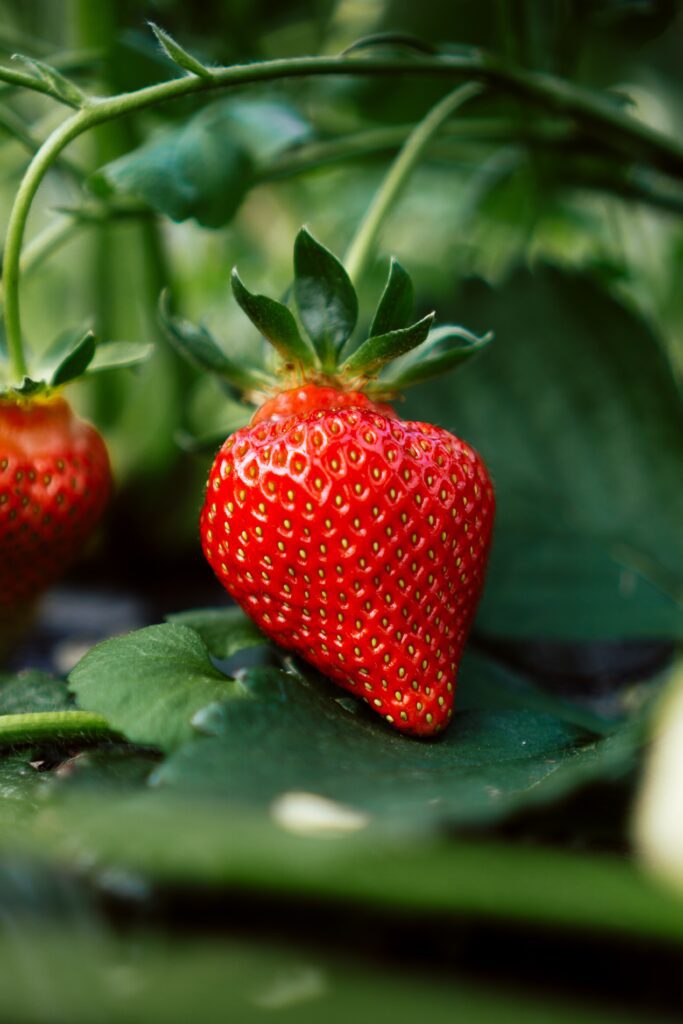We love strawberries. Those ruby red jewels are one of our favourite tastes of summer. They are low-calorie nutrition powerhouses, packed full of vitamins, fibre, and potent antioxidants known as polyphenols. And if that weren’t enough, they are cholesterol, sodium and fat free.
Strawberries are however, one food you should eat organic and here is why.
- Organic strawberries have been found to be more nutritious than those farmed conventionally. In a study comparing organically and conventionally produced strawberries, organic strawberries were found to contain significantly higher levels of vitamin C (9.5% more), polyphenols (10.5% more) and antioxidants (8.5% more)1.
- Organic strawberries may have more anticarcinogenic properties. In a study published in the Journal of Agricultural and Food Chemistry2, it was found that extracts taken from organically grown strawberries had a higher antiproliferative activity on both breast and colon cancer cells than conventional strawberries. It was suggested that organic strawberries may contain a higher content of metabolic compounds that are capable of cleaning out dangerous cancer-causing free radicals.
- Organic strawberries quite simply taste better. Yes, they may be smaller, but they pack punch. In consumer sensory tests conducted which were compared against strawberry soluble solid levels, organic strawberries were found to more attractive, less watery, more dense, firm, sweeter and flavourful1.
But it’s also what you don’t get with organic strawberries…

- Simply put, organic strawberries provide less of a pesticide cocktail than conventionally grown strawberries. Higher quality soils with greater microbial activity produce strawberry plants which are healthier, less prone to spoilage, and do not require the same levels of pesticides which are systemic in conventional strawberry farming1. Similar findings are discussed by independent consumer group Choice, who conducted in lab tests in 2008 and 2014 and who found that organic strawberries contained less pesticide and fungicide residues and were less prone to rot than conventionally grown strawberries3.
What you consume is a real mystery pesticide cocktail. It is worth noting that although there are strict recommendations governing the use of pesticides in Australia known as maximum residue limits (MRL) set out by Food Safety Australia and New Zealand (FSANZ)4 who ensure that the food we eat and the environment we live in remain safe, national monitoring and regulation of this system is sub-par.
A report conducted by an independent panel commissioned by the Australian government in 2021 found a lack of a general system for monitoring and reporting on domestic produce as a serious gap in Australia’s current regulatory system5, 6. This means, you never know what you are going to get, either with strawberries themselves, or across the doses we ingest across all the foods we eat.
Numerous negative health effects are associated with pesticide use. Much is unknown about how the human body deals with pesticides. Whether they are metabolised and excreted or accumulated and stored. Many studies have found however that negative health effects are associated. These include neurological, carcinogenic, gastrointestinal, respiratory, dermatological, reproductive and endocrine effects7, 8, 9,10. Organic strawberries therefore pose fewer risks than those farmed conventionally.
Bottom line: With greater health benefits and fewer health risks, we’d rather our strawberries be organic.
In fact, therefore here at Glo Health, we choose to carry ONLY Australian organic fruit and veg.
References
- Reganold JP, Andrews PK, Reeve JR, Carpenter-Boggs L, Schadt CW, et al. (2010) Fruit and Soil Quality of Organic and Conventional Strawberry Agroecosystems. PLOS ONE 5(9): e12346. https://doi.org/10.1371/journal.pone.0012346
- Marie E. Olsson, C. Staffan Andersson, Stina Oredsson, Rakel H. Berglund, and Karl-Erik Gustavsson. Antioxidant Levels and Inhibition of Cancer Cell Proliferation in Vitro by Extracts from Organically and Conventionally Cultivated Strawberries. Journal of Agricultural and Food Chemistry 2006 54 (4), 1248-1255. DOI: 10.1021/jf0524776
- Choice. (2014). Strawberries and Pesticides. Retrieved from https://www.choice.com.au/food-and-drink/food-warnings-and-safety/pesticides/articles/strawberries-test-reveals-health-concerns
- Food Standards Australia New Zealand (FSANZ). Food Standards Code. Retrieved from https://www.foodstandards.gov.au/code/pages/default.aspx
- DAWE 2021, Final Report of the Independent Review of the Pesticides and Veterinary Medicines Regulatory System in Australia, Department of Agriculture, Water and the Environment, Canberra, April. CC BY 4.0.
- Friends of the Earth. The Dose Makes the Poison. 2012. http://d3n8a8pro7vhmx.cloudfront.net/foe/legacy_url/378/TheDoseMakesThePoisonFeb2012_0.pdf?1471404362.
- Nicolopoulou-Stamati P, Maipas S, Kotampasi C, Stamatis P, Hens L. Chemical Pesticides and Human Health: The Urgent Need for a New Concept in Agriculture. Front Public Health. 2016 Jul 18;4:148. doi: 10.3389/fpubh.2016.00148. PMID: 27486573; PMCID: PMC4947579.
- Sarailoo, M., Afshari, S., Asghariazar, V. et al. Cognitive Impairment and Neurodegenerative Diseases Development Associated with Organophosphate Pesticides Exposure: a Review Study. Neurotox Res 40, 1624–1643 (2022). https://doi.org/10.1007/s12640-022-00552-0
- Marras, C., Canning, C.G. and Goldman, S.M. (2019), Environment, lifestyle, and Parkinson’s disease: Implications for prevention in the next decade. Mov Disord, 34: 801-811. https://doi.org/10.1002/mds.27720
- Grewal, A.S., et al. Pesticide Residues in Food Grains, Vegetables and Fruits: A Hazard to Human Health. (2017) J Med Chem Toxicol 2(1): 1- 7.



